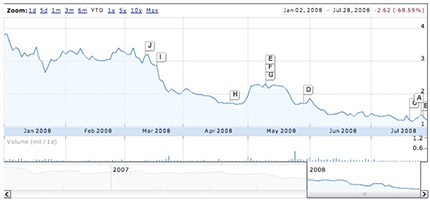 Paul Melcher's blog - Thoughts of a Bohemian -Jupiter is Not Responding, talks about the decline in the Royalty-Free market:
Paul Melcher's blog - Thoughts of a Bohemian -Jupiter is Not Responding, talks about the decline in the Royalty-Free market:And that got me to thinking that it might be time to dust-off an old perspective that needs to be re-visited.
Without significant numbers, it is hard to figure out why Jupiter is having such a hard time. Guess is that they are suffering from the same effect as Getty Images : a declining rights manage market, a suffering traditional RF demand, and a microstock division not covering for the losses.
Simply put - if you need a photograph of a man waving a flag with fireworks behind him, and I sell it to you for one time, or a limited rights package, when you need it again, you'll pay me again - and likely pass that expense on to the client. If, instead, I sell it to you once, for an unlimted amount of time and uses, I only get paid that once (and often a fraction of the charge of the first time) and you can use it forever - still likely to pass the "standard rights-managed charge" to the client - obstensively for "access to your image library" (of RF images.)
What flunkie accountant didn't see that this well would eventually run dry? Lots of up-front one-time CD sales for $249 with 100 images, organized by theme - all you can eat/use. There's no back-end resales of those images to that client - ever.
In the quest for Wall Street appeasement, Getty rolled-up many smaller companies, and slashed and burned their way through the industry. Jupiter Images (Nasdaq: JUPM) has watched a similar fate appear. Meckler points to the chart below (a 68% decline in 6 months, and heck, a year ago it was $8.14, now it's down to $1.20), and it sure looks like Getty's chart:

Should we be surprised? Nope.
Fortunately, things can begin anew, without the Gettys and Jupiters of the world (in their current form), once they're gone. The images of people using cell phones will become dated, so too people with cars, hairstyles, clothing styles, and other things that make a photo look old. When was the last time a stock image of a CRT television was used? In a few short years, the image to show was a flat-screen TV, and with the 2009 shift to digital by the broadcasters, CRT televisions are done and gone for - so to images that include them. A Motorola flip-phone? So 90's!
August 7th, when much of New York is vacationing in the Hamptons, Jupiter will have their 2Q financial results (MarketWatch reports here), and Meckler suggests they're reveal there a slashing of upwards of 100 employees. When you run into once of these employees, remind them that the historical excuse for why they were attempting to devalue the business by selling microstock/Royalty-Free - "I was just doing my job", or "I was just following orders", just doesn't excuse their behavior.
Please post your comments by clicking the link below. If you've got questions, please pose them in our Photo Business Forum Flickr Group Discussion Threads.
You need to address the purchaser of the images before hating on the supplier. Jupiter responded to a market. I have experience at both a large internet publisher and book publisher. Both businesses seek royalty free images because they are cheap.
ReplyDeleteI just finished a book for a big name publisher and I was told to use Shutterstock for the majority of the 360 images in the book. Why Shutterstock? Not because of their high-quality images (LOL) but because of their subscription deal -- we could download 25 images a day for just $269.oo a month and use them forever.
The publishers need to step-up and take responsibility for driving the market down. Until they do, there will always be someone selling one of their photos for $1.00.
In response to Anonymous at 5:23am: I have to disagree with you. There will always be customers looking for a deal, but the smart business person is the one that charges enough to stay in business. I would like to be able to buy a brand new car for $1000, but I'd get laughed out of the dealership if I actually went in and tried that. More of our colleagues need to (nicely, professionally) start "laughing these clients out of the dealership!"
ReplyDeleteTalley
Silver Spring, MD
You missed my point Talley. Responsibility lies with both parties -- but until the publishers take a stand -- the demand for cheap photos will drive those who supply them.
ReplyDeleteNo, he's right, you're wrong. The demand for $1,000 cars would be nigh-inexhaustible too, but I don't see any car companies clamoring for the business.
ReplyDeleteM
There are far fewer car dealers than photographers and the distribution channels for photo stock cover a wider audience. It's not exactly a great comparison, but I get your point.
ReplyDeleteGood ole' Jupiter Images, getting into the business with no way to make anything more than the narrowest of profits, if that. And now it's turned into making no profits at all. They never had a working business model for themselves.
ReplyDeleteGood ole' Jupiter, all the while slashing their costs of acquiring inventory by sucking in photographers with pie-in-the-sky promises.
Good ole' Jupiter, they were a great sinkhole while it lasted. Oh well, they performed a valuable service, propping up the bottom lines of scores of for-profit publishers, even if they never took those profits to the bank themselves.
Next time I see a Jupiter Images on the horizon, I'll be sure to get a few more shares of my favorite publishing stock, Time Warner. I like my dividends.